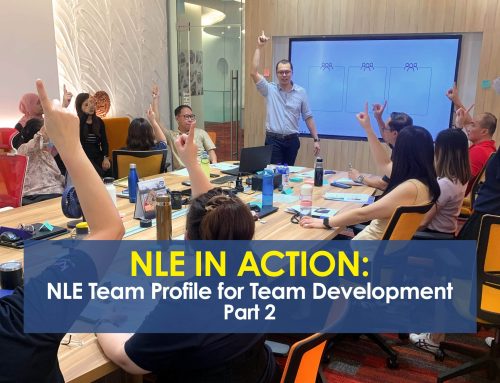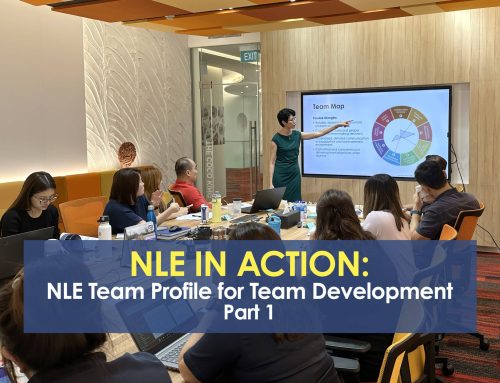I remembered a story Barney told us about a client who wanted to cure alcohol addiction. The problem was he kept relapsing largely because of influences from his friends. And every time that happened, Barney would pull him back and redesign a new change plan for him.
You see, the client already knew his “why”. He also had a good change plan which was the “how”. His challenge of implementing the “how” became his handicap.
If we apply this on ourselves or our coaching clients, you will find that actually many of us have this handicap too. And this is what causes us to give up and fail.
We can pre-empt our handicap before we start anything.
All we need is to tweak the mechanics of our change plan. We need some kind of “anti-handicap” solution, such that in times of struggle, we won’t back down and our efforts can be sustained. This article is about the 3 Anti-Handicap Factors you can design into your implementation plan even before you begin anything:
- Routine
- Power of the Group
- Knowing your Willpower
Let’s start with Anti-Handicap Factor #1, Routine.
Imagine you’re a very busy person, and you’ve been wanting to exercise more. Every day, you bring your gym shoes to work, but at 4:30pm, you still have tonnes of emails to answer, and your colleagues are seeking your help. Now, you have to make a decision – to hit the gym, or stay back and work?
Chances are, you end up working and postpone the gym.
Now you really want to exercise more and you know how important this is to you. But having the perfect scenario in which to implement your change can be difficult. So you skip the plan until you can get the timing, the mood and even the partner right. Sounds familiar?
You’ll never have the perfect scenario.
You’ve probably heard of “making time”. Think of the last time you cancelled appointments when a family member was ill, or when you delegated your work to go on a date. Your time will always flow to what’s important to you. Similarly, change happens when you allocate time in your life for it to happen. You need to make it a part of your daily routine.
Routine change does not have to be something big in your life.
For clients and our NLP students, we work with them to implement small things in their routine: adjusting their posture, taking breaks, waking up / going to sleep 30 minutes earlier or spending 1 hour with their children. In fact, these are simple things that most people want in their lives, and all they need is to commit to the action they want, set a time when they’ll do it daily and then start doing it.

After one week, look back at your week.
Our clients and students have found that they made more progress in this one week than in the many years they’ve struggled back and forth. Do you see how simple this is? One small action, set the time, fit it into your daily routine, and keep going.
Routine change is a must-have for any implementation plan. Otherwise, you’re waiting for change to happen, not making it happen. Now let’s see how we can stack on another factor to improve your chance of succeeding.
Anti-Handicap Factor #2: Power of the Group
Have you ever woken up very early in the morning because you promised to have breakfast with someone? That feeling of not wanting to disappoint them got you up in the morning, didn’t it? Somewhat similarly, when it comes to making change happen, when you declare your goal to a friend, you’ll stay accountable to your words.
The key is in finding the friend or group who can support you.
When you have someone who understands why you want to change and would never judge you for your choices – it’s very empowering. They will cheer you on when you fall and continue to believe that you will succeed; this will increase your chances of succeeding.

Groups thrive based on common understanding.
For example, in our classes, we work hard to cultivate a group culture where “there’s no failure, only feedback.” And people love this because they feel safe and supported to try something new, knowing that no one will laugh.
And when people are willing to take steps to change, it gives others the permission to do the same. One by one, we see people trying new habits, trying to listen more, pay more attention to others and be more patient. Common understanding is what sustains groups and creates miracle transformations.
Now you have the routine and the group, so you need to know one last factor which could be the most important one to ensure that your plan doesn’t backfire.
Anti-Handicap Factor #3: Know your willpower
If you’ve tried to change a habit or pick up a new skill, you understand that these need willpower. You need to exert self-control to keep practising. But did you know that willpower has a limit which determines whether your change will last?
Roy Baumeister, psychologist at the Florida State University was the first scientist to test the limits of willpower.
Through various experiments – getting people to resist cookies, hold back anger, tune out distractions – Roy discovered that willpower is like a muscle: the more it’s used, the more it gets tired and people can run out of willpower, like an exhausted athlete. Worse, getting people to control emotions can lead to not just emotional outbursts, but people can become more willing to spend money on things they didn’t need.
When you are implementing change, it’s easy to run out of willpower.
Especially when you have other existing priorities such as work or family. Imagine coming home from a difficult day at work and you want to spend one quality hour with your family. In a perfect scenario, this may be doable. But what if your child is throwing tantrums or your spouse had a bad day? It might trigger your impatience, anger and you’d end up slouching in front of the TV. Good reason to postpone your change?

Knowing your willpower limit helps you be smart about change.
First, when designing your implementation plan, you want to be mindful of a few things. Do you have too many willpower draining activities in your life? Are you trying to implement too many changes in an already-demanding routine?
You want to implement only one or two changes at a time, and build up the momentum. Momentum will make you use less willpower, and seeing your small progress, it will recharge your willpower.
Will these factors work for you if you’ve been a chronic quitter?
Quitting is often due to the inability to fit the change in your routine or a lack of willpower. Are you often in a state of low willpower? If you don’t have enough to make even a small change, you need to review your routine. Give yourself a chance to make one small change, and you aim for your first successful non-quitting experience. This will become a powerful marker for you.
Let’s summarise the 3 Anti-Handicap Factors:
- Fit change into your daily routine. Commit a fixed time to do it every day.
- Find a friend or a group of people who will hold you accountable and cheer you on.
- Be mindful of your willpower. Change no more than two things at a time. Focus on progress and momentum.
“He who has a why to live for can bear almost any how”?
To a certain extent, we do like Nietzsche’s quote. But when it comes to making change last, you must practise “proactive optimism”. It is the day-to-day how – what you do, how you do it, pushing for “one-more”, and how you sustain your motivation that determine whether you’ll succeed or not.
Remember the alcoholic client that Barney worked with?
He did get out of alcoholism. In fact, he stumbled upon a rare opportunity to have all three factors in place for him to change. He accepted a job in rural Australia, moved there, lost contact with his drinking buddies, fell in love, his daily routine changed, and there were less stress and things that drained his willpower. We were happy for him, and we must say, his story helped us come up with the Anti-Handicap Factors of change. These factors are very suitable for personal change and coaching, and we wish you success in using it!
Are you working on changing habits or wanting to improve your communication and self-mastery?
We have a short ebook on the micro NLP applications that our students are implementing into their daily routine. Check out NLP in a Day.
We are also happy to have you visit our class.
Come see our “no failure only feedback” group culture. You’ll be inspired by how serious people are about improving themselves. Apply for our class sit-in.
[inf_infusionsoft_inline optin_id=”optin_2″]






